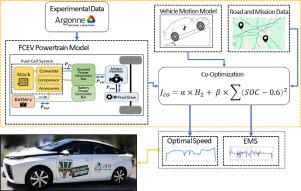智能燃料电池电动汽车速度规划与能量管理协同优化的燃油效率
IF 8.3
2区 工程技术
Q1 CHEMISTRY, PHYSICAL
引用次数: 0
摘要
燃料电池电动汽车(fcev)为可持续交通提供了一条有前途的道路,但其全部潜力取决于有效的能源管理策略(EMS)。智能驾驶提供了将速度规划与EMS集成以提高效率的机会。本研究提出一种协同优化框架,对智能燃料电池汽车的速度规划和EMS进行联合优化。为丰田Mirai开发了一个能源模型,并使用实际测试数据进行了验证。制定的最优控制问题(OCP)在规划减速时考虑了电池和电动机的约束,最大限度地减少了氢消耗,有效地避免了功率峰值,并最大化了再生制动。该方法与广泛研究的顺序优化方法进行了比较。在1000米前视窗口的平坦道路上,它可以减少25%的燃油消耗。在不同速度限制和坡度的实际条件下,它将氢消耗从39 g减少到24.46 g,实现了36%的改进和更平稳的动力配置。本文章由计算机程序翻译,如有差异,请以英文原文为准。

Fuel efficiency through co-optimization of speed planning and energy management in intelligent fuel cell electric vehicles
Fuel cell electric vehicles (FCEVs) offer a promising path to sustainable transportation, but their full potential depends on an effective energy management strategy (EMS). Intelligent driving offers an opportunity to integrate speed planning with EMS for improved efficiency. This study proposes a co-optimization framework that jointly optimizes speed planning and EMS for intelligent FCEVs. An energy model for the Toyota Mirai is developed and validated using real-world test data. The formulated optimal control problem (OCP) minimizes hydrogen consumption, effectively avoids power peaks, and maximizes regenerative braking by considering battery and electric motor constraints when planning deceleration. The proposed method is evaluated against widely studied sequential optimization approaches. On a flat road with a 1000-m look-ahead window, it achieves a 25% reduction in fuel consumption. Under realistic conditions with varying speed limits and slopes, it reduces hydrogen consumption from 39 g to 24.46 g, achieving a 36% improvement and a smoother power profile.
求助全文
通过发布文献求助,成功后即可免费获取论文全文。
去求助
来源期刊

International Journal of Hydrogen Energy
工程技术-环境科学
CiteScore
13.50
自引率
25.00%
发文量
3502
审稿时长
60 days
期刊介绍:
The objective of the International Journal of Hydrogen Energy is to facilitate the exchange of new ideas, technological advancements, and research findings in the field of Hydrogen Energy among scientists and engineers worldwide. This journal showcases original research, both analytical and experimental, covering various aspects of Hydrogen Energy. These include production, storage, transmission, utilization, enabling technologies, environmental impact, economic considerations, and global perspectives on hydrogen and its carriers such as NH3, CH4, alcohols, etc.
The utilization aspect encompasses various methods such as thermochemical (combustion), photochemical, electrochemical (fuel cells), and nuclear conversion of hydrogen, hydrogen isotopes, and hydrogen carriers into thermal, mechanical, and electrical energies. The applications of these energies can be found in transportation (including aerospace), industrial, commercial, and residential sectors.
 求助内容:
求助内容: 应助结果提醒方式:
应助结果提醒方式:


